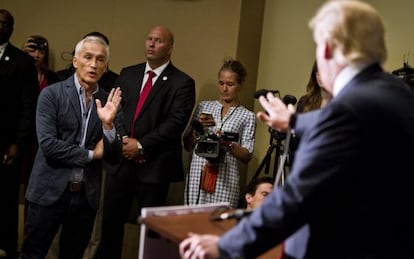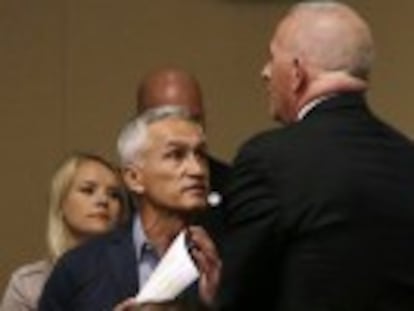Jorge Ramos: the ratings leader who champions the Latino cause in the US
After a 25-year career, the anchor has become the “Walter Cronkite of Hispanic America”

The New York Times has said that Univision news anchor Jorge Ramos has the power to send “shivers” down the spine of the Republican Party. CNN reporter Christiane Amanpour has written that “with another presidential election coming up,” if anyone can change the way Hispanic Americans are treated in the US, “Ramos can – and he must.”
With 450 days to go before Americans choose their next leader, it is still too early to know if the anchor at the country’s biggest Spanish-language TV network has already conditioned the campaign after being expelled from a press conference by Republican presidential hopeful Donald Trump.
But this latest incident represents one more step in a long journalistic career inspired by a clear cause: that no US politician should ever forget that one out of every six citizens they serve is Hispanic.
Ramos’s influence is such that he has been dubbed “the Walter Cronkite of Latino America”
At the age of 57, Ramos is now a consolidated public figure who acts as the face of the Hispanic community on US television. He is the news anchor that millions of Latinos trust to keep them abreast of current events. But his commitment extends far beyond the TV studio: last summer Ramos swam the Río Grande to illustrate the dangers that immigrants face trying to cross into the United States.
As he did at the Trump press conference, Ramos routinely travels wherever necessary to personally question politicians who refuse to enter his studio for a face-to-face interview.
Some of these interviews have had a direct influence on US politics: a quarter of a century after leaving Mexico City at age 25 to start a new life in Los Angeles, Ramos sat down with America’s first African-American president and extracted a pledge to reform the immigration system to regularize the situation of the country’s 11 million undocumented migrants. At that moment, both men’s careers became intertwined: President Obama owed Hispanics the reform, while Ramos took on the responsibility of ensuring that the promise was kept.

And while the journalist’s power does not extend so far as to force the president to sign a bill into law, he has made insistence his own personal trademark. For years after that interview, Ramos followed Obama to news conferences and other public events to ask him why he had failed to make good on his word. Even after Obama announced a decree that would allow nearly half of all illegal immigrants to remain in the country, Ramos accused him of “destroying many families” for waiting so long.
“He says he asks every question as if it’s his last,” wrote Christiane Amanpour in a column for Time magazine that named Ramos one of the most influential people of 2014. “He knows he has a voice and is not afraid to use it.” Not even to ask for the resignation of Mexican President Enrique Peña Nieto when he picked up the Time award this year.
Ramos has cemented his career on exchanges such as the one he had with Trump on Tuesday. In an earlier face-off with Republican Party chairman Reince Priebus, he accused him of defending an immigration policy based on “deportations, deportations, deportations.” In 2012 he asked Republican hopeful Mitt Romney about his migratory policy based on “self-deportation.” And he told Ted Cruz, another Republican, to explain why he wanted to deny Hispanics “the same opportunity” that Cruz’s own father had when he left Cuba for the US.
This attitude has brought Ramos closer to the role of an activist, especially on immigration issues. He himself has always defended that the issue is a “personal” matter, given that he himself is a Mexican migrant who moved north of the border with a guitar and a suitcase full of dreams, like so many millions of others.
Ramos waited until 2008, the year he turned 50, to apply for US citizenship. “When you are an immigrant, you never forget it,” he told the LA Times at the time.
His story is also the story of the two million viewers who tune into his news program every night. His vision connects with people who are worried about Obama’s frustrated immigration reform, and who see Univision as an ally that speaks to them in their own language.
Ramos’s influence is such that he has been dubbed “the Walter Cronkite of Latino America,” as The New York Times reported earlier this year, in a reference to the veteran anchor about whom US President Lyndon B. Johnson allegedly said: “When you lose Walter Cronkite, you’ve lost the war.”
And this influence will be felt when US Latinos – over 50 million strong – go to the polls at the next presidential elections. The Republican Party has 15 months to realize that unless it manages to convince four out of every 10 Hispanic voters, it will lose the race to the White House. Ramos has already reminded Obama of this fact. Now he wants the Republicans to listen to him, too.
English version by Susana Urra
Tu suscripción se está usando en otro dispositivo
¿Quieres añadir otro usuario a tu suscripción?
Si continúas leyendo en este dispositivo, no se podrá leer en el otro.
FlechaTu suscripción se está usando en otro dispositivo y solo puedes acceder a EL PAÍS desde un dispositivo a la vez.
Si quieres compartir tu cuenta, cambia tu suscripción a la modalidad Premium, así podrás añadir otro usuario. Cada uno accederá con su propia cuenta de email, lo que os permitirá personalizar vuestra experiencia en EL PAÍS.
En el caso de no saber quién está usando tu cuenta, te recomendamos cambiar tu contraseña aquí.
Si decides continuar compartiendo tu cuenta, este mensaje se mostrará en tu dispositivo y en el de la otra persona que está usando tu cuenta de forma indefinida, afectando a tu experiencia de lectura. Puedes consultar aquí los términos y condiciones de la suscripción digital.









































